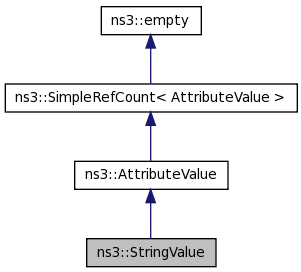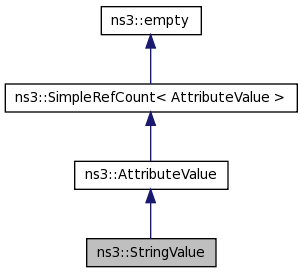ns3::StringValue Class Reference
[Attribute]
hold variables of type string More...
#include <string.h>


Public Member Functions | |
| StringValue (const std::string &value) | |
| void | Set (const std::string &value) |
| std::string | Get (void) const |
| template<typename T > | |
| bool | GetAccessor (T &value) const |
| virtual Ptr< AttributeValue > | Copy (void) const |
| virtual std::string | SerializeToString (Ptr< const AttributeChecker > checker) const |
| virtual bool | DeserializeFromString (std::string value, Ptr< const AttributeChecker > checker) |
Detailed Description
hold variables of type string
This class can be used to hold variables of type string, that is, either char * or std::string.
Member Function Documentation
| virtual Ptr<AttributeValue> ns3::StringValue::Copy | ( | void | ) | const [virtual] |
- Returns:
- a deep copy of this class, wrapped into an Attribute object.
Implements ns3::AttributeValue.
| virtual bool ns3::StringValue::DeserializeFromString | ( | std::string | value, | |
| Ptr< const AttributeChecker > | checker | |||
| ) | [virtual] |
- Parameters:
-
value a string representation of the value checker a pointer to the checker associated to the attribute.
- Returns:
- true if the input string was correctly-formatted and could be successfully deserialized, false otherwise.
Upon return of this function, this AttributeValue instance contains the deserialized value. In most cases, this method will not make any use of the checker argument. However, in a very limited set of cases, the checker argument is needed to perform proper serialization. A nice example of code which needs it is the EnumValue::SerializeToString code.
Implements ns3::AttributeValue.
| virtual std::string ns3::StringValue::SerializeToString | ( | Ptr< const AttributeChecker > | checker | ) | const [virtual] |
- Parameters:
-
checker the checker associated to the attribute
- Returns:
- a string representation of this value.
In most cases, this method will not make any use of the checker argument. However, in a very limited set of cases, the checker argument is needed to perform proper serialization. A nice example of code which needs it is the EnumValue::SerializeToString code.
Implements ns3::AttributeValue.
The documentation for this class was generated from the following file:
- src/core/string.h
 1.6.1
1.6.1